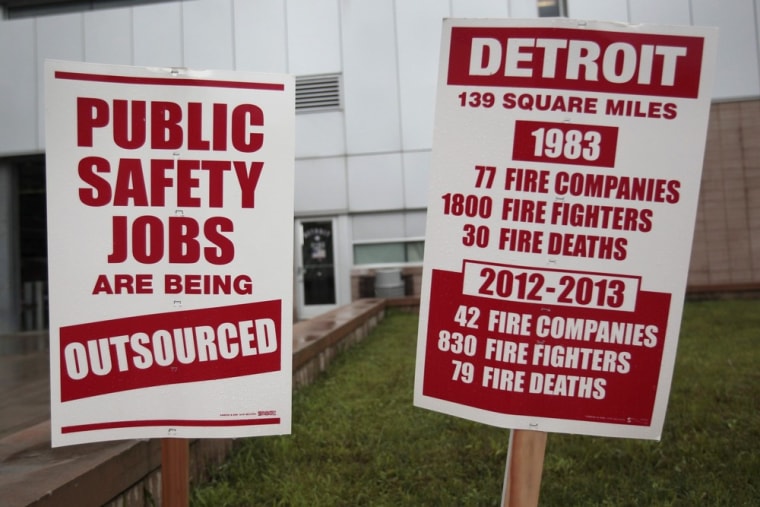Detroit's largest-ever municipal bankruptcy could make more history on Wednesday when a federal judge is expected to rule on whether U.S. law trumps Michigan's constitution to preserve the pensions of city workers.
The judge's decision could impact dozens of other states and cities facing financial stress for years to come.
The hearing will be the latest legal skirmish pitting the city's state-appointed emergency manager against more than 100,000 creditors, including pensioners, as lawyers for all sides are sailing in uncharted waters.
"You have go back to the 19th century when states repudiated their Civil War debts to see anything like this," said John Tuohy, Arlington County, Va., deputy treasurer, who chairs the pension committee of the Government Finance Officers Association. "This will be studied in law schools for the next 30 years."
The case took another twist Tuesday when Michigan’s appeals court halted all ongoing challenges to the constitutionality of the bankruptcy filing pending in state court. The appellate court asked for additional briefs before deciding the next step, according to Morgan Cole, a law clerk for Ingham County Circuit Judge Rosemarie Aquilina, who has scheduled a Monday hearing on those challenges.
(The order) stops the proceeding until they make a decision whether to send it back to trial court whether they’re going to keep it or whether they’re going to send it up to the Supreme Court of Michigan,” said Cole.
The main event in the legal wrangling comes Wednesday morning, when federal judge Steven Rhodes in Michigan is expected to rule on whether U.S. law trumps the state’s constitutional protection against rescinding retired city workers’ pensions. Bond holders who have relied for centuries on a government’s “full faith and credit” to repay their investments will also be there to argue their case.
The legal precedent the case sets will be watched closely by dozens of other states and cities grappling with under-funded pension promises.
"I can guarantee every county and city attorney in the U.S. has been watching this with great interest," said Tuohy.
Lawyers for unions who opposed last week's historic Chapter 9 bankruptcy filing are expected to make a last-ditch argument that the law which granted the city's emergency manager, Kevyn Orr, the authority to make the bankruptcy filing violates the state's constitution.
Bankruptcy lawyers say that argument faces an uphill legal battle because federal courts typically have the power to interpret state constitutions.
"It's a cardinal principal of law that every federal court has the ability to determine its own jurisdiction," said Bruce Zirinksy, a bankruptcy lawyer with Greenberg Traurig in New York. "The federal court is also able to enjoin any state court action which will interfere with its jurisdiction."
But opponents of Detroit's bankruptcy will be armed with a ruling handed down Friday by Ingham County Circuit Judge Rosemarie Aquilina, who agreed with their argument that Detroit violated the Michigan Constitution. She ordered the filing be withdrawn and has scheduled her own hearing next Monday.
Appearing Wednesday before Rhodes, opponents of the bankruptcy filing will argue that the question is solely a state matter, placing it outside the reach of federal courts, a doctrine known as "independent and adequate state grounds," according to Aquilina's law clerk Cole.
"Generally, federal courts will deny discretion to review an issue it if it rests solely on state grounds," she said.
Regardless of tomorrow's ruling, bankruptcy law experts say, the case could involve multiple appeals to both state and federal courts, with little legal precedent to shape the outcome. Most of the several hundred cases that have been filed since the modern Chapter 9 code was amended in 1978 involve small municipal entities like water or sewer districts.
Only a handful of cities and counties have used the law to restructure debts, and none with anything close to the 100,000 creditors and more than $18 billion in debt owed by Detroit.
With such a long list of creditors lining up armies of attorneys, Orr's office is assembling his own team of lawyers, consultants and financial advisers. And he doesn't need court approval to pay their salaries.
Bankruptcy experts say the case could take years, and could prove to be very costly for the city.
"Bankruptcies are expensive," said Andrew Gottfried, a bankruptcy lawyer with Morgan Lewis. "You're going to see staggering bills that Detroit is going to have to pay if this case drags on."
Detroit city workers and retirees are digging in for a long fight. Union officials argue that the city has mismanaged their pension fund and hasn't done all it can to collect back taxes to cover its debts. They also argue that the city's bid to cut retiree pensions violates state law.
"They want to rape and plunder the city of Detroit without any real voice of the city workers or the citizens," Albert Garrett, president of AFSCME Council 25, which present city workers, told NBCNews.
Union lawyers also plan to argue that the city has not tried hard enough to negotiate voluntary concessions. In the weeks before last week's filling, Orr conducted a series of whirlwind talks in which he reportedly offered as little as ten cents on the dollar toward the city's obligations.
But, in an interview Monday with NPR, Orr said it's not clear yet just how deeply pensions would be cut.
"There's a lot of talk about there's going to be no pensions and that's not true," he said. We're just talking about adjusting them to today's realities… We just don't know how deep."
—By CNBC's John W. Schoen. Follow him on Twitter at@johnwschoen.
More business news:
